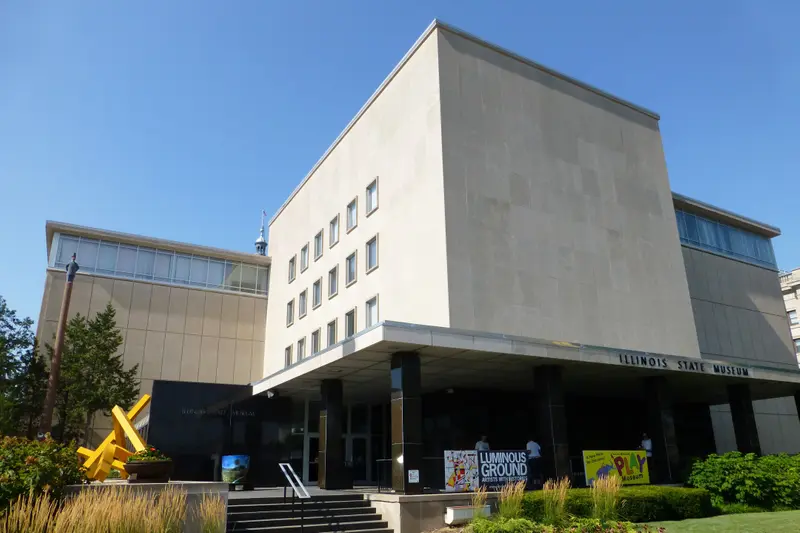ProPublica is a nonprofit newsroom that investigates abuses of power. This story is part of an ongoing series investigating the return of Native American ancestral remains. Sign up for ProPublica’s Repatriation Project newsletter to get updates as they publish and learn more about our reporting.
Sweeping Repatriation Reform Bill Unanimously Passes Illinois House of Representatives
If signed into law, the legislation would create a protected cemetery for the reburial of repatriated Native American ancestors and establish a committee of tribal leaders to review state projects that may disturb culturally significant sites.


Series: The Repatriation Project
The Delayed Return of Native Remains
For more than 30 years, tribal nations have been asking the state of Illinois and its state-run institutions to return the remains of their ancestors for reburial within the state. For just as long, Illinois has made that nearly impossible.
But now, legislation moving through the Illinois General Assembly would finally pave the way for the remains of thousands of Native Americans to be repatriated.
The legislation, which unanimously passed the Illinois House of Representatives this month, comes after nearly two years of consultations among the leaders of more than two dozen tribal nations, the Illinois State Museum and the state Department of Natural Resources.
In January, a ProPublica investigation revealed that institutions have not returned the remains of at least 15,461 Native Americans who were excavated from Illinois. We also revealed how the Illinois State Museum had for decades displayed open Native American graves at Dickson Mounds, a burial site that was billed as a tourist attraction and then as an “educational” exhibit before its closure in the 1990s.
“We’re grateful for the bipartisan support we’ve received from Illinois legislators who are working to right historic wrongs that have, put simply, diminished us,” said Prairie Band Potawatomi Nation Chairperson Joseph “Zeke” Rupnick. “This legislation brings respect to our history and our ancestors the way they should’ve been respected centuries ago.”
State Rep. Mark L. Walker, a Democrat who represents part of Chicago’s northwest suburbs, said he introduced the bill after leaders of the Prairie Band Potawatomi Nation brought the issue to his attention. Walker, who has a master’s degree in anthropology, said it is “atrocious” that some museums and universities still keep the human remains and funerary items of Native Americans.
“These people were buried by their people with the goods they wanted to be buried with in spaces they wanted to be buried in and [we] disturbed that,” Walker said. “Just go repair it. It’s so simple.”
He added: “I don’t know what right we have to dig up somebody’s grandmother.”
Most excavated Native American remains in Illinois are held by state universities and museums. Our investigation found that the Illinois State Museum holds the remains of at least 7,000 Native Americans, yet it has returned only 2% of them to the tribal nations who could claim them under the Native American Graves Protection and Repatriation Act, a 1990 federal law that pushed for the expeditious return of human remains and funerary items excavated from Indigenous burial sites. The museum has the country’s second-largest collection of unrepatriated Native American remains, and one of the lowest return rates.
Following ProPublica’s reporting, institutions across the U.S. have vowed to return the Native American remains held in their collections. In Illinois, the proposed legislation could signal a new era of proactive repatriation and consultation with tribal nations in a state that has favored the curation and scientific study of these remains over their return.
“Native tribes have existed since before colonization, and our land and culture are the foundation of our society,” Rupnick said. “Yet the remains of thousands of our ancestors are in the hands of governments and institutions, just as our Native lands have been for centuries.”
Cinnamon Catlin-Legutko, who until her death this year served as the director of the Illinois State Museum, previously told ProPublica that the state needed to revise its existing burial law and ensure that tribal nations have more say in how their ancestors are protected and returned. According to the minutes of a November meeting of the Illinois State Museum board of directors, Catlin-Legutko said she was working on legislation with the Department of Natural Resource’s legal team.
The museum and Department of Natural Resources declined interview requests for this story, citing policies against commenting on pending legislation.
If passed by the Senate and signed into law, the bill would create a cemetery on state land where repatriated Native American ancestors and their belongings could be reburied. The state would be responsible for protecting the cemetery, which would not be for public use, from potential looting or vandalization.
Since at least the mid-1990s, state officials have known that tribal nations with cultural and geographical connections to Illinois wished to have their ancestors reburied. ProPublica obtained records from 1995 showing that the Illinois State Museum conducted consultations with leaders from 15 tribes with ancestral ties to Illinois to discuss the cultural affiliations of human remains, as required by the federal law. In those conversations, every tribal leader told the museum that the human remains in its collection should be reburied in Illinois.
In the intervening years, the museum repatriated the remains of at least 156 Native Americans, most of them to the Peoria Tribe of Indians of Oklahoma. But Illinois did not provide land for reburial and those ancestors were reburied in Oklahoma despite the preference that tribal leaders had expressed in the 1990s.
The Peoria Tribe of Indians of Oklahoma declined to comment for this story.
In addition to the creation of a cemetery, the bill would also establish a committee of leaders from more than 30 tribal nations to review state construction or other projects that might affect burial sites and other places of religious or ceremonial importance. The group would serve as an unprecedented Native voice in state affairs.
“For me, this work really is about recentering power,” said state Sen. Cristina H. Pacione-Zayas, a Chicago Democrat who sponsored the bill. “And [it’s about] communities who have been historically harmed and where policy has explicitly taken out their humanity, taken out their agency, taken out their ability to be self-determined.”
The legislation acknowledges that the state “has not maintained meaningful consulting relationships with tribal nations” and points to the “State of Illinois’ long history of removing tribal nations.” Today, there are no tribally held lands in Illinois.
“Without meaningful relationships between the State of Illinois and tribal nations, there has been harm caused to tribal nations and trust needs to be rebuilt as the State works to correct those harmful mistakes,” the bill reads.
Walker said that describing the historical context of forced removal in the bill is significant.
“It’s part of the larger discussion: Are we going to face our history or aren’t we?” he said. “As adult human beings, I think it’s time we embraced our entire history.”
The bill would establish a Tribal Repatriation Fund, which could only be used to help return ancestors and items and for reburial and would help pay for repatriation work using money from fines and other penalties collected from individuals or organizations that knowingly disturb burial sites.
Significantly, the proposed law shifts the ownership of any Native American remains and funerary items still buried in the state or accidentally unearthed from public lands to Native American nations. The current burial law, the Illinois Human Skeletal Remains Protection Act, passed in 1989, deems most Native American remains to be property of the state.
ProPublica is a nonprofit newsroom that investigates abuses of power. This story is part of an ongoing series investigating the return of Native American ancestral remains. Sign up for ProPublica’s Repatriation Project newsletter to get updates as they publish and learn more about our reporting.
ProPublica is a nonprofit newsroom that investigates abuses of power. This story is part of an ongoing series investigating the return of Native American ancestral remains. Sign up for ProPublica’s Repatriation Project newsletter to get updates as they publish and learn more about our reporting.
More than 30 federally recognized tribes have cultural or geographical ties to the land that is now the state of Illinois. For this story, ProPublica reached out to representatives of the Peoria Tribe of Indians of Oklahoma, the Miami Tribe of Oklahoma, the Osage Nation, the Wyandotte Nation and the Prairie Band Potawatomi Nation. If you are a representative of a tribe with ties to Illinois and would like to share comments with ProPublica, please email us at [email protected]
More than 30 federally recognized tribes have cultural or geographical ties to the land that is now the state of Illinois. For this story, ProPublica reached out to representatives of the Peoria Tribe of Indians of Oklahoma, the Miami Tribe of Oklahoma, the Osage Nation, the Wyandotte Nation and the Prairie Band Potawatomi Nation. If you are a representative of a tribe with ties to Illinois and would like to share comments with ProPublica, please email us at [email protected]






